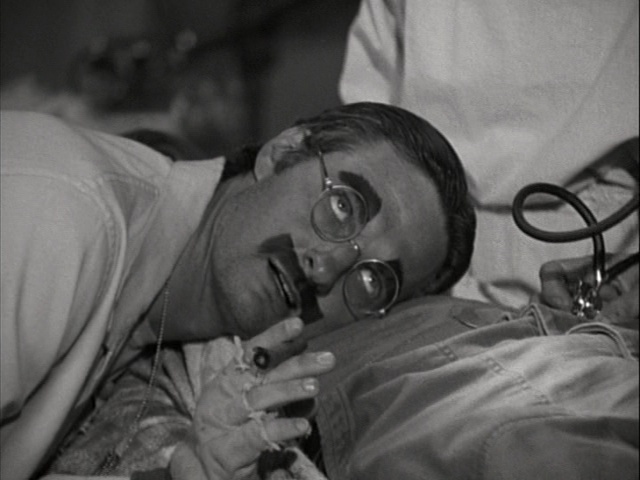Every Monday, I spotlight a random episode of M*A*S*H, providing a brief review and asking readers to offer their thoughts.
“Yankee Doodle Doctor” (#6, 1×06)
Originally Broadcast: Sunday, October 22nd, 1972
Written by Laurence Marks
Directed by Lee Philips
Capsule Summary: Hawkeye and Trapper sabotage an official Army documentary about the 4077th and instead direct and star in their own honest if irreverent film.
I believe this is the first episode I’ve reviewed as part of my Episode Spotlight feature that wasn’t chosen randomly. While watching “Requiem for a Lightweight” (which I reviewed last week) I decided I felt like watching another episode from Season One and settled on “Yankee Doodle Dandy,” which coincidentally also featured Marcia Strassman as Nurse Margie Cutler. Like “Requiem for a Lightweight,” this is another wonderful early episode even if the plot is a bit thin.
This episode marked the first appearance of Herb Voland as General Crandell Clayton. He went on to appear in seven episodes, more than any of the other generals during the first two seasons of M*A*S*H. Clayton was the third general to debut, after Hammond and Barker, but due to episodes being aired out of order an episode with Hammond (“Henry, Please Come Home”) would air before Clayton returned in “Tuttle” later in Season One.
Nobody ever really explains during the episode why a documentary on MASH units is being made, other than a vague desire to inspire viewers back in the United States. General Clayton seems earnest and Colonel Blake wants only to promote the 4077th. We don’t really know what Bricker’s grand vision for the film is, other than what little we hear of Frank’s narration which is bombastic but relatively harmless.
(Speaking of narration, this episode features a rare use of voice over narration on M*A*S*H when Hawkeye says “First, we’ll get a hold of Radar” to Trapper, explaining how they’ll sabotage the film.)
The way Hawkeye and Trapper react to the film, therefore, seems somewhat overblown. It’s an Army puff piece. Bricker may be guilty of caring more about getting his shot than wounded soldiers, and he’s certainly full of himself, but he’s not some devious propagandist.
That said, I definitely prefer Hawkeye’s interpretation. But who’s really the star? Hawkeye’s Yankee Doodle Doctor, inspired by Groucho Marx, or Trapper’s silent, horn-honking sidekick? The party in the Mess Tent is perhaps my favorite part of the film. I love the way Hawkeye and Trapper appear so pious while walking towards the Mess Tent only for it to erupt into a wild party, complete with Cutler dancing on a table, right as they walk in.

I’ve always loved Hawkeye’s line “When they came to get me I was hiding under the front porch trying to puncture my eardrum with an ice pick.” It so perfectly captures the character.
No explanation is given for why Hawkeye and Trapper are dancing together, which makes me wonder whether it was in the original script or added later, perhaps to pad out the episode.
During the scene in which Bricker is introduced to everyone in the Swamp, the shaving cream on Frank’s face changes consistency.
The nurse Bricker is flirting with in the Mess Tent is smoking. It’s one of a very few times a cigarette is seen on the series. Cigars are far more common.





I think Trapper as the horn-blowing sidekick was meant to be Harpo Marx (which makes sense, as Hawkeye was channeling Groucho).
Agreed.
Hawkeye (Alda) does a good job as a Groucho impersonator. Many comedians have imitated Groucho, but I find Alda’s interpretation one of the better ones. In fact it is easy to see Groucho’s influence in Alda’s portrayal of Hawkeye throughout the series — but particularly the early (less melo-dramatic) seasons.
Trapper also does a very passable version of Harpo.
It’s interesting because I recently heard Alan Alda say that Groucho wasn’t an influence on his character. He said the Marx Bros type of physical humor and constant puns were not something he really found funny. But he said that it was written in the scripts at times for him to say things ironically so he did the Groucho voice here and there.
A lot of people will say that “Sometimes You Hear The Bullet” was the turning point in the series when drama came into play, but, IMO, if you think about it, the ending that Hawkeye did at the end of the “documentary” was truly the first into the drama thing. Overall, though, a great episode. And, yes, they were no “saints in surgical garb” (love that phrase).
Great episode! Trapper’s Harpo is a riot, and I love General Clayton’s confused “What the hell was THAT?” when they’re previewing the film. Hawkeye’s dramatic turn at the end of the movie is terrific. A very strong season one episode!
I don’t understand why Hawkeye and Trapper were all so fired up about the movie. It’s not like the movie would have been used to recruit more soldiers. As Henry mentions to them, it would have highlighted the good work the doctors were doing at the front and maybe even helped them with more aid to the M*A*S*H units.
That saying, the movie that they ultimately end up making was hilarious. Hawkeye’s Groucho was spot on. Gen. Clayton was my favorite of all the generals and I wish they had used him more. His interactions with Margaret were solid gold.
Good episode and is amusing to watch a couple of times.
“Nobody ever really explains during the episode why a documentary on MASH units is being made”
The army, and other branches of service, churned out hundreds of such promotional films over the years; the military version of industrial films. They were used in recruiting drives, shown to civic groups, in schools, occasionally in theaters before or after the feature. They were a staple of the early days of television since they were freely distributed and had running times of a few minutes to an hour or more so were easy “filler”.
In fact the army actually produced a TV show, “The Big Picture”, from these films; it was freely syndicated to any station to use as they pleased, and was part of the ABC schedule from ’53-’59.
This has been a long term favorite of mine for the same reason everyone else likes it: the silly movie with the Marx Bros impressions. However, there is one thing about this episode that annoys me slightly.
Let’s back up a little first. In the Pilot episode, Hawkeye and Trapper disobey orders and hold a party where they dishonestly rig a raffle (yes, I understand why but it’s still cheating). In Market to Market, they steal Henry Blake’s new desk. In Requiem for a Lightweight they cheat to win a boxing match. In The Moose, they cheat at gambling. So these early episodes pretty much establish that the show’s protagonists aren’t exactly the most, well, honest people in the world.
Now, I know the justification would be that they did these dishonest things for a good cause – to raise money for Ho Jon, to get needed medicine, to set a Moose free (though that case is harder to make re. cheating in a boxing match just to bring a nurse they have the hots for back to camp). But then we get into the sticky ethical argument of whether the ends justify the means, which I’d rather not wade into here. Suffice it to say that, justified or not, Hawkeye and Trapper are not above lying, cheating and stealing to get things done (and I haven’t even mentioned the sometimes cruel pranks they played on Frank).
However, in Yankee Doodle Doctor, when they decide that the Army is being less than honest about the war, boy does that get their dander up. How dare the Army lie! So what do they do? They expose the film to light, destroying property not their own (akin to stealing). Then, when Col. Blake confronts them, they play dumb, pretending they didn’t know about it and never owning up to the deed. IOW, they lie – exactly what they accuse the Army of doing.
Pot. Kettle. Black?
Now, I understand that M*A*S*H is entertainment and that we don’t look to the characters as moral guides or role models. So I’m not complaining from that standpoint; it’s a sitcom, not a Sunday School class. I’m just saying that the immoral behavior of the characters doesn’t jibe very well with their moralizing. Maybe it’s a clash between the madcap hijinks of the movie M*A*S*H (which the sitcom tried to imitate) and the heavy anti-war message that the writers felt compelled to keep inserting into the show. You end up with the uncomfortable disconnect of amoral characters getting all sanctimonious about the faults of others.
Anyway, I still like the show.
Very well put, Rosemarie.
As nota bene by ‘someone above’
(and do hope uTube link works ok, also is ‘approved’ ?)
https://youtu.be/-zgsaWSFugg?t=212
Get back later with ‘more’ on this/that (etc)
For now see if flys … engage scotty (aye)
Ahhh … Good, uTube link does work, and if able to embed videos here (?) that would be good’er, so then no need to ‘leave’, just watch it ‘here’ … and ‘as go’ maybe discover/learn how to ‘do that’, or if anyone can ‘explain’ and/or point me to ‘site place info here/etc’ that does do the explain/set up/etc ? … TIA
… and (again) back later with Yap/Yip on That Video … and This Episode
(udder stuff too … laters)
Youtube sais: Video Unavailable
This may have only been Season 1, but the way the episode proceeded presaged what actually happened to “M*A*S*H” the series itself — Alan Alda had his own vision for the thing and eventually took over as the de facto showrunner, just as Hawkeye did in “Yankee Doodle Doctor.”